- Solar advice hub
- Solar-technology
- Heat pumps & solar panels: the expert guide
Heat pumps & solar panels: the expert guide
Here's how a heat pump works with solar, how much it costs to buy and run, and which homes are most suitable.


Why you can trust our content
We know that the solar industry is full of misinformation, but we only use reliable sources, including:
- Our experienced solar experts, installers and system designers
- Our own database of solar & battery system designs
- Authoritative bodies like MCS and the UK government



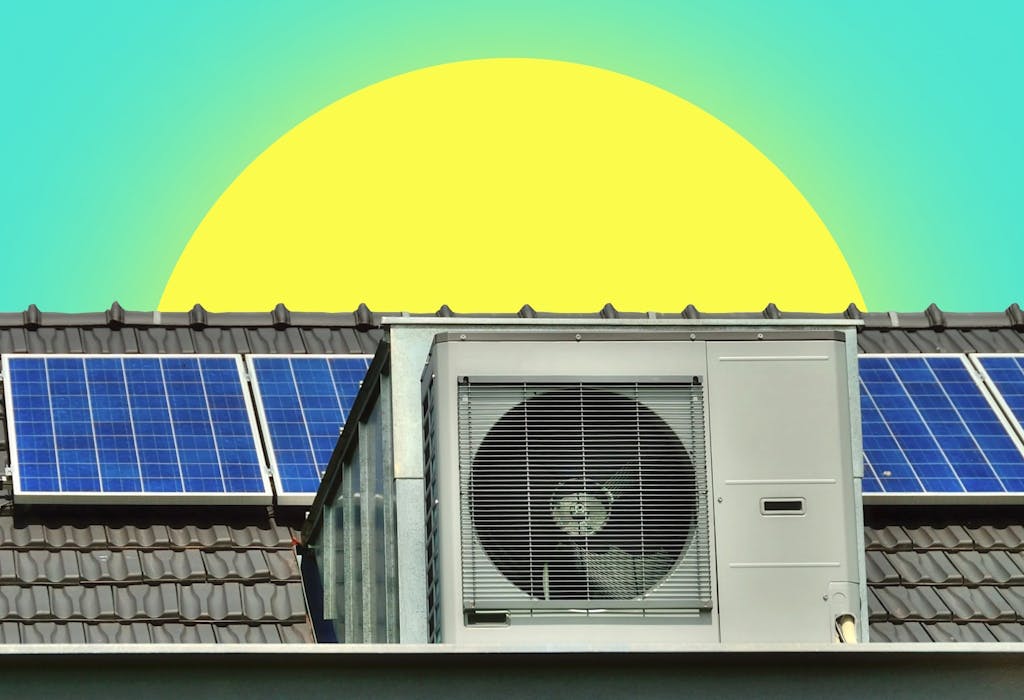
Solar panels and heat pumps: at a glance
If you like the idea of solar panels, chances are you’ll be thinking of adding a heat pump too – after all, you can run it on the electricity you generate with your panels.
And with Sunsave Plus offering solar panels for no upfront cost and government grants reducing the price of heat pumps, now is an excellent time to make the switch.
In this guide, we’ll explain how using a heat pump with solar panels works, how many panels you’ll need, and which properties are suitable.
If you would like to see the savings you could get from a solar & battery system, answer a few questions below and we’ll provide an estimate.
Find out how much you can save
What kind of home do you live in?
Can you power a heat pump with solar panels?
You can certainly power a heat pump with solar panels; heat pumps are powered by electricity, and solar panels produce electricity all year round.
In fact, it’s one of the best ways to lower your heating bills at the same time as reducing your electricity bills.
You can't expect to cover 100% of your heat pump's electricity needs with solar panels, but your system will still provide a significant chunk.
A heat pump will also slash your bills by increasing your self-consumption – that is, how much of your solar electricity goes towards powering your property, instead of being sent to the grid.
Heat pump sales are growing, with more than 280,000 now installed in the UK – and over half of those installations have taken place since the start of 2021.
A heat pump will usually increase the average three-bedroom household’s annual electricity usage by around 3,200 kilowatt-hours (kWh) per year.
This will roughly double your total electricity consumption and raise your bills – unless you get solar panels, which can provide you with plenty of free electricity, across the year.
How does it work?
Like a gas boiler, your heat pump will stay on at all times, but will only run – and use substantial amounts of electricity – when it’s needed.
So whenever your property drops below the preferred temperature you’ve set – either according to your thermostat or thermostatic radiator valves – your heat pump will start running.
When this happens during the day, your solar panels will at least partly power your heat pump.
The solar electricity your system produces is sent to power as many electric appliances running in your home as possible. There’s no hierarchy of needs or way of telling which devices receive this green electricity.
So if your solar panels produce 0.7kWh of electricity over an hour, and you use 0.7kWh or less in that hour, your heat pump’s energy consumption will be 100% solar over that time.
If you consume 1kWh in that hour, your entire home’s electricity usage will be 70% solar – including your heat pump.
Adding a solar battery to your system will enable you to run your heat pump – and other home appliances – with solar electricity more of the time, which will cut your energy bills further.
There’s no such thing as a 'solar heat pump' that’s more compatible with solar panels than other models, since all heat pumps work well with solar panels.
This is for the best, since your heat pump will also almost certainly need to use grid electricity at various times.
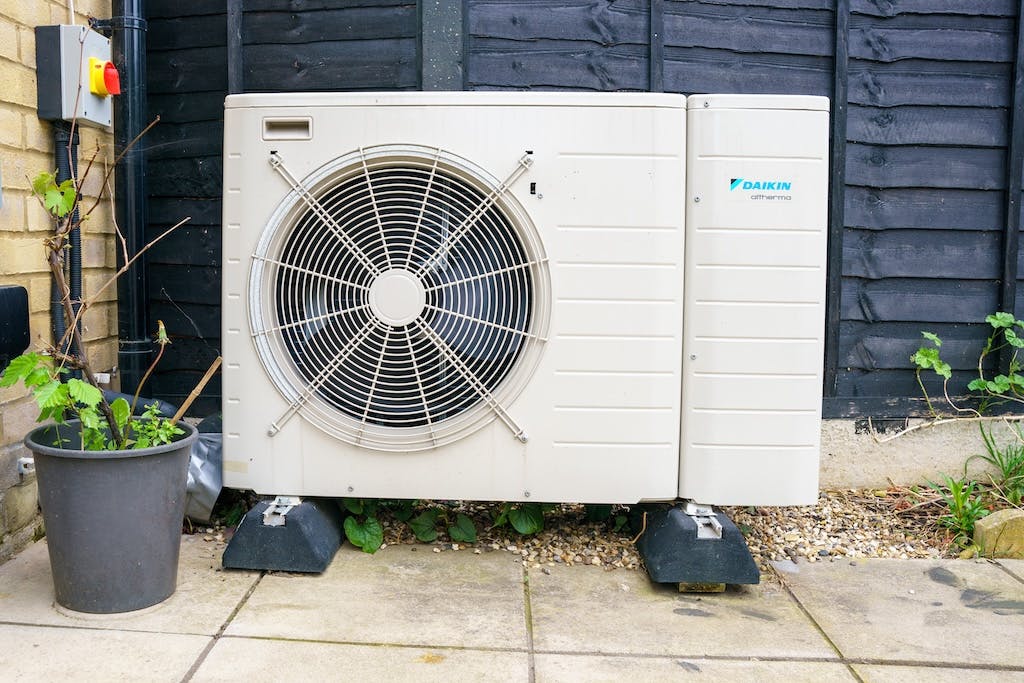
Can solar panels fully power a heat pump?
It's unlikely that solar panels will fully power your heat pump, unless you get an extraordinarily large system.
This is mostly down to heating needs being highest in winter, when solar panels usually produce less electricity.
A 2024 study by the Fraunhofer Institute for Solar Energy Systems analysed the impact of a solar & battery system on a home with a heat pump.
It found that the 12.3 kilowatt-peak (kWp) solar panel system and 11.7kWh battery supplied 36.2% of the electricity necessary to run a 13.9kW ground source heat pump for the 256m² house.
This 36.2% figure is also known as the 'solar fraction', which refers to the percentage of total electricity needed for the heat pump that the solar & battery system supplies.
Of the 5,064kWh of electricity the heat pump consumed, 17.8% came directly from the solar panels, and 18.4% was sourced from the battery. The other 63.8% was grid electricity.
Solar vs grid: a heat pump case study
This is an unusually large solar & battery system, supplying electricity to a big heat pump – but since it was all sized up together, the solar fraction should be consistent with a more regular setup.
It should therefore give you a good idea of what to expect if you combine a heat pump with a solar & battery system, though it's still just one example.
Your solar fraction could be much higher, depending on multiple factors.
These include the size of your solar panel system, battery, and heat pump, and whether or not you run your heat pump's hot water heating and disinfection cycle during daylight hours.
We'll explain the pros and cons of doing this further down.
Air source vs ground source heat pumps
Air source heat pumps use the warmth present in the air as fuel, whereas ground source heat pumps absorb geothermal warmth, using underground pipes.
The complex, disruptive nature of a ground source heat pump installation – which involves either laying 30-50 metres of pipe or drilling boreholes in your garden – makes it the more expensive option.
But in terms of how solar panel systems power them, the two types of heat pumps are identical. As well as natural warmth, they require electricity to function, which solar panels supply.
Ground source heat pumps are usually more efficient across the year, since it's warmer below ground than above it, on average.
They also tend to be more powerful, though this has more to do with the households that have the space and money to get one, rather than being an inherent trait.
This all means ground source heat pumps will make slightly better use of the solar electricity you provide them with, and will generally need more of it.
It's always true that you'll save and earn more with a larger solar panel system, but this fact is especially crucial when you're boosting your electricity usage with a ground source heat pump.
How many solar panels do you need to power a heat pump?
How many solar panels you need to power your heat pump alongside your home’s other appliances will ultimately depend on where you live, how much electricity you consume, and when you need it.
A heat pump will increase the amount of electricity your household requires, so you’ll need a larger solar panel system if you want to generate most of the electricity you use – but any size system will help cut your bills.
| Annual electricity usage (kWh) | Annual electricity usage with a heat pump (kWh) | Number of solar panels required (430W) | Annual output (kWh) |
|---|---|---|---|
| 3,400 | 6,600 | 19 | 6,945 |
A typical three-bedroom home will need a 8.2kWp system to run a heat pump for most of the year, which you can do by getting 19 solar panels with 430-watt peak ratings.
However, a smaller system will still save you a significant amount on your electricity bills.
A heat pump with an average efficiency rating of around 350% – that is, one that produces three and a half times as much energy as the electricity it takes in – will need around 3,200kWh (kilowatt-hours) per year to heat the average three-bedroom household.
Since the same household needs 3,400kWh of electricity per year to power its other appliances, it requires a total of 6,600kWh, which in the UK can typically be achieved with 19 panels.
Getting a system this size will cut your heating bill significantly, especially if you also get a storage battery.
This will ensure that even after the sun goes down, you can use solar electricity to heat your home – shrinking your bills further.
Verified expertThe ideal number of solar panels you should get doesn’t really change depending on whether you have a heat pump - either way, it’s best to make full use of the space on your roof. Once you’ve paid the fixed costs of installation such as scaffolding and labour, it makes sense to get as many solar panels as possible.
Alfie Ireland
Head of Operations & Technical at Sunsave
Alfie has worked in green tech for over a decade. During his four years at OVO, he helped develop the world’s largest domestic vehicle-to-grid trial.
Is a solar battery necessary for a heat pump?
A solar battery is the best way to ensure your solar panels supply as much electricity to your heat pump as possible.
During winter, spring, and autumn, you can fill up your battery with solar electricity in the daytime, then use this stored energy to heat your household when it gets dark.
In the summer you won’t need your heat pump as much, so after the sun sets, you can sell the electricity in your battery to the grid, through one of the best export tariffs.
As a heat pump will significantly increase your electricity usage, it makes sense to get a slightly bigger battery, to allow you to reduce your bills by using as much solar electricity as possible.
However, it's usually best not to get an oversized battery so you can squeeze every last drop of solar electricity out of winter, when your heat pump's consumption will be at its highest – or you'll end up with a battery that's too big in summer.
The only possible exception to this rule is if you sign up to an import tariff like Cosy Octopus, which has off-peak periods you can use to charge your battery.
You can then use this electricity to run your heat pump whenever you like.

The UK's first solar subscription
- No upfront cost
- Fixed monthly fee
- 20-year Sunsave Guarantee
Winter vs summer
No realistic domestic setup will be fully sufficient in winter, when solar panels generate less electricity – around 11% of their annual output – right as the thermometer drops and heating usage rises.
As a result, your self-consumption rate should rise. In the study mentioned above, scientists found the household used 94%-100% of its solar electricity in winter, because of this imbalance between supply and demand.
In this situation, with the household's solar fraction plummeting to a high of 26% just as the heat pump requires 63% of its annual usage, the grid will smoothly plug the gap.
During the summer however, your panels are very likely to produce excess electricity, which you can sell to the grid via a solar export tariff.
Due to this overabundance of solar electricity, self-consumption for the home in the study fell below 50% between May and August, hitting a low of 25% in July. The rest can be sold to the grid.
The study also discovered that the heat pump's solar fraction increased above 90% in summer, as the household only relied on it for hot water.
So even though you’ll need to rely on the grid to provide some electricity for your heat pump in winter, you can still save and earn hundreds of pounds per year with a solar & battery system.
How much does a heat pump with solar panels cost?
A heat pump with a solar & battery system that can power your home’s electricity and heating for most of the year would usually cost the average household £28,000 – but you can reduce this to £5,000 upfront with the Boiler Upgrade Scheme and Sunsave Plus.
Buying a heat pump and getting it installed typically costs around £12,500, according to the Microgeneration Certification Scheme (MCS), but the government’s Boiler Upgrade Scheme can cut this amount to £5,000.
If you get an 8.2kWp solar panel system with a 5.2kWh battery – which should ensure most of the electricity you use comes from your solar panels – this would usually cost you around £15,500. To learn more, check out our guide to solar panel costs and solar battery costs.
However, if you sign up to Sunsave Plus, you can get this system with no upfront cost.
You’ll also receive the Sunsave Guarantee, which includes 20 years of 24/7 monitoring and maintenance, free battery and inverter replacements, and downtime cover. Your system will also be insured by Aviva.
| Hardware & schemes | Rough upfront cost | Deductions |
|---|---|---|
| 8.2 kWp solar panel system & 5.2kWh battery | £15,500 | - |
| Heat pump | £12,500 | - |
| Boiler Upgrade Scheme | - | -£7,500 |
| Sunsave Plus | - | -£15,500 |
| Total | £5,000 | - |
How much does a heat pump cost to run with solar?
Running a heat pump with a solar & battery system will cost the typical three-bedroom household £224 per year, for a saving of £572.
This is 72% less than the cost of powering a heat pump with grid electricity alone, which is £796 per year for the average home, using the January 2025 price cap.
We’ve assumed your heat pump will be roughly 350% efficient, and that you’ll consume around 3,200kWh of electricity for heating per year, which follows Ofgem’s averages.
We’ve also assumed that your system will export around one-third of the electricity it produces, and that you’ll split the remaining electricity equally across your heat pump and the rest of your home.
Powering the rest of your household’s appliances with solar energy will save you another £572, on average – and your exports should earn you hundreds of pounds too, depending on which tariff you pick.
How much your household will save also hinges on factors including your location, the size of your solar & battery system, and the amount of electricity and heating your home requires.
Using a heat pump with solar panels slashes your household’s carbon emissions by a total of 2.6 tonnes of CO2 per year, on average.
Are there any grants for heat pumps and solar panels?
| Grant | What it covers | Eligibility criteria | When it expires |
|---|---|---|---|
| Boiler Upgrade Scheme | • £7,500 grant towards the cost of a heat pump | • Homeowners and small business owners • Properties in England and Wales • A valid EPC |
March 2028 |
| ECO4 | • Up to 100% of the cost of a solar & battery system and/or heat pump | • Electrically heated households in Britain that receive a qualifying benefit • Low-income homes with a vulnerable resident • Energy-inefficient social housing |
March 2026 |
| The Home Upgrade Grant | • Up to 100% of the cost of a solar & battery system and/or heat pump | • Owner-occupied homes in England that don’t primarily use a gas boiler • Must have an EPC of D, E, F, or G • Annual household income of £36,000 or less (limit varies regionally) |
March 2025 |
| Home Energy Scotland Grant & Loan | • Up to £7,500 grant towards the cost of a heat pump, plus an optional £7,500 interest-free loan | • Homeowners in Scotland | No end date yet |
| Welsh Government Warm Homes Programme | • Up to 100% of the cost of a heat pump | • Homeowners and private renters in Wales • An EPC score of 54 or lower • An EPC score of 68 or lower if a member of your household has a chronic circulatory, respiratory, or mental health condition • Low-income households • Recipients of a qualifying benefit |
April 2031 |
There are several heat pump and solar panel grants available to households in the UK.
The Boiler Upgrade Scheme is available to all homeowners in England and Wales, and allows you to get £7,500 off the cost of an air, ground, or water source heat pump.
If you live in a Scottish property that you also own, the government’s Home Energy Scotland Grant & Loan performs a similar function – with an extra £7,500 interest-free loan, if you want it. The scheme’s solar provision ended in June 2024, though.
The government’s ECO4 scheme compels large suppliers to install solar panels in electrically heated, energy-inefficient households.
If you own or privately rent a home – or live in social housing – that has an Energy Performance Certificate (EPC) rating of D-G, and someone in your household receives a qualifying benefit, you may be able to get solar panels for free.
You may also be able to qualify if you live in a low-income household, or if you’re vulnerable to the effects of living in a cold home.
The Home Upgrade Grant can provide solar panels and a heat pump for a large discount or completely free, at your local council’s discretion – but only if you’re not connected to the gas grid.
It’s available in hundreds of local authorities all over England, for low-income homeowners with an EPC rating of D-G.
And if you’re in Wales, you may be able to access the Welsh Government Warm Homes Programme, which provides free measures including heat pumps and solar panels.
To qualify, you must own or privately rent your home, have a low rating on your EPC report, and either live in a low-income household or receive a means-tested benefit.
You could also look into solar panel loans.
If you’re wondering how much a solar & battery system could save you, answer a few questions below and we’ll provide you with an estimate.
Find out how much you can save
What kind of home do you live in?
Is your home suitable for a heat pump and solar panels?
Most homes in the UK are suitable for a heat pump and solar panels.
Heat pumps can be installed in all property types – from flats to detached houses – and in homes from any architectural era, according to the government-funded Electrification of Heat project.
That means your property’s suitability will instead come down to whether you have a good level of insulation, and enough space for the different components. You’ll need room outside for the external unit, and space inside to fit a hot water cylinder.
Ideally, you’d also have underfloor heating or large radiators, but it’s not essential.
To be suitable for solar panels, you’ll just need to own a suitable roof that’s at least mostly unshaded, faces south, east, or west (although north-east and north-west will sometimes be sufficient), and can support the weight of panels – which most can.
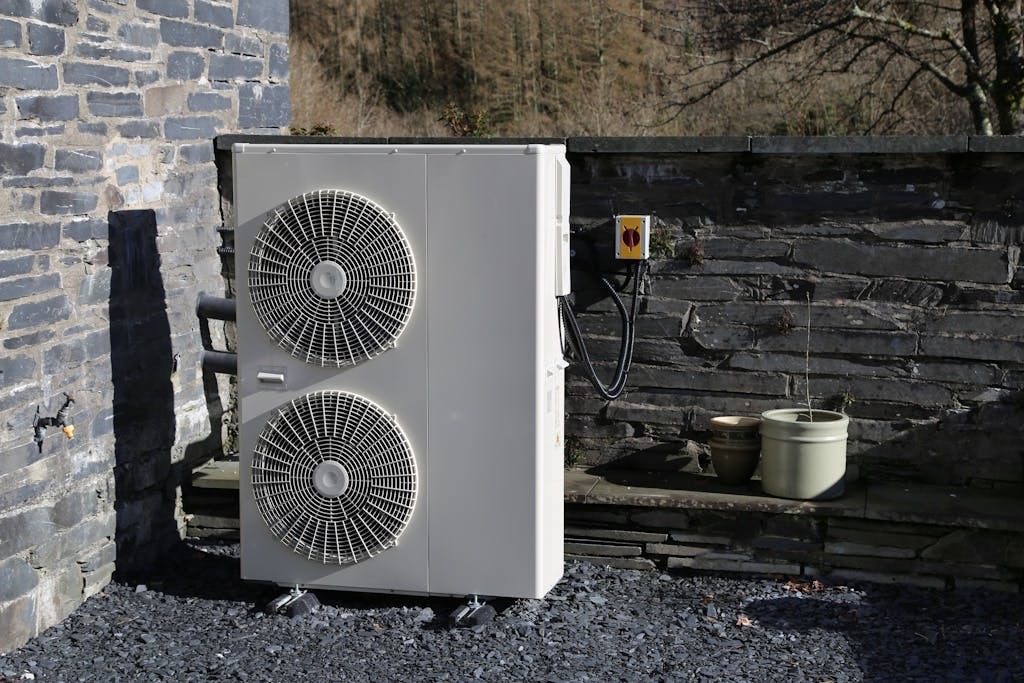
The best import & export tariffs for a heat pump with solar
The best import and export tariffs for a solar home with a heat pump are currently provided by Octopus and E.ON.
If you choose Octopus's 15p per kWh Outgoing Fixed export rate, you should sign up for Cosy Octopus, which offers three daily off-peak periods when importing is 51% cheaper than the standard variable rate.
Households that go with E.ON can benefit from Next Export Premium v2, which pays 21p per kWh but is only available if you install with E.ON – or Next Export Exclusive, a 16.5p per kWh rate for the supplier's electricity customers.
In either case, you should also sign up for E.ON Next Drive, which enables you to import electricity for 6.7p per kWh from 12am to 7am.
Homes with a large battery will generally benefit more from picking E.ON, since its off-peak import rate is considerably lower.
If you do select one of these import tariffs, you should mark its off-peak times by charging your battery, using some of your highest-consuming machines (e.g. your washing machine), and scheduling your heat pump's hot water heating and disinfection cycle.
Another option is to charge your battery on off-peak electricity, use this supply to power your home and heat pump, then export 100% of your solar-generated electricity.
In some situations, this may be more profitable – though of course, you still won’t be able to power your heat pump with a battery alone.
To read our full guide to import and export rates, check out our guide to the best solar export tariffs.
At Sunsave, we’ll consider your individual circumstances before making a recommendation.
Most homes in the UK are suitable for a heat pump and solar panels.
What’s the environmental benefit of a heat pump with solar panels?
The environmental benefit of using a heat pump with solar panels is that it reduces the average household’s annual carbon emissions by 74%, or 2.6 tonnes of CO2.
This means that such a setup would wipe out the great majority of the typical home’s carbon footprint.
Generally, your heat pump will get about 64% of its electricity from the grid, which still uses gas and coal to generate 27% of its electricity.
This will result in 0.3 tonnes of CO2 emissions – which is a saving of 1.9 tonnes compared to the average gas boiler, according to Nesta.
With a 8.2kWp solar panel system, the average system in the UK will produce an extra 5,345kWh on top of the power needed for your heat pump – which will save an additional 0.7 tonnes of CO2 per year by replacing most of your grid electricity.
Next steps
The best way to run a heat pump is with free, green electricity produced by your own solar panels.
You can cut your energy bills by hundreds of pounds per year, and take advantage of tariffs that reward you for using your heat pump and solar electricity in certain ways.
With government grants like the Boiler Upgrade Scheme making heat pumps affordable and Sunsave Plus providing a solar & battery system at no upfront cost, this is a great time to jump on board.
If you’re interested in how much you could save with a solar & battery system, just answer a few quick questions below and we'll generate an estimate for you.
Find out how much you can save
What kind of home do you live in?
Heat pumps with solar panels: FAQs
Related articles
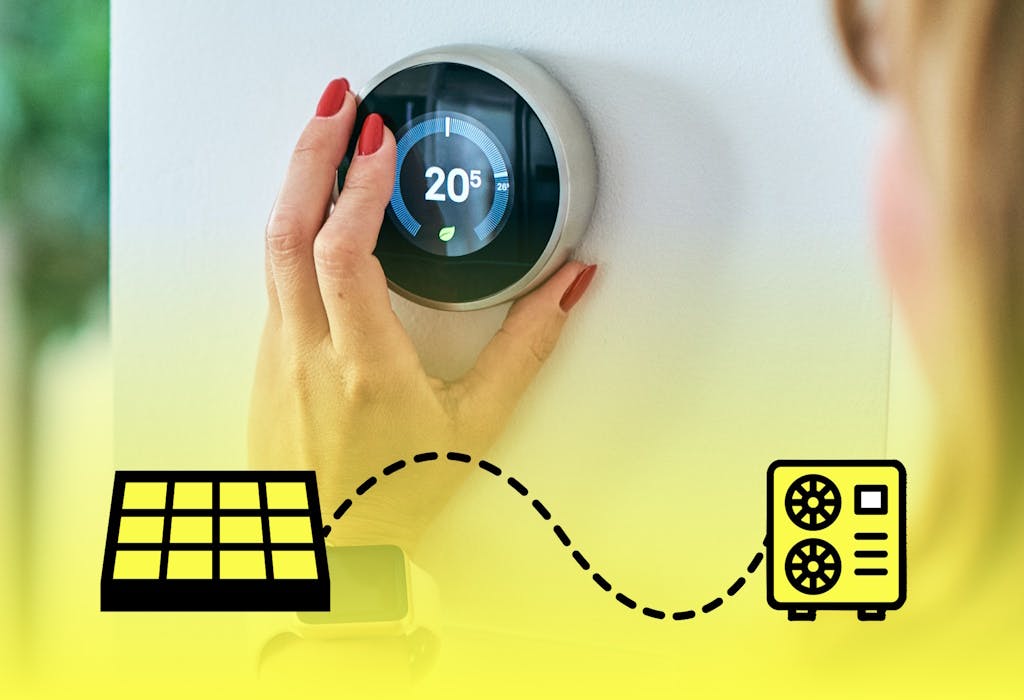
Can solar panels heat a house in the UK?
Read full story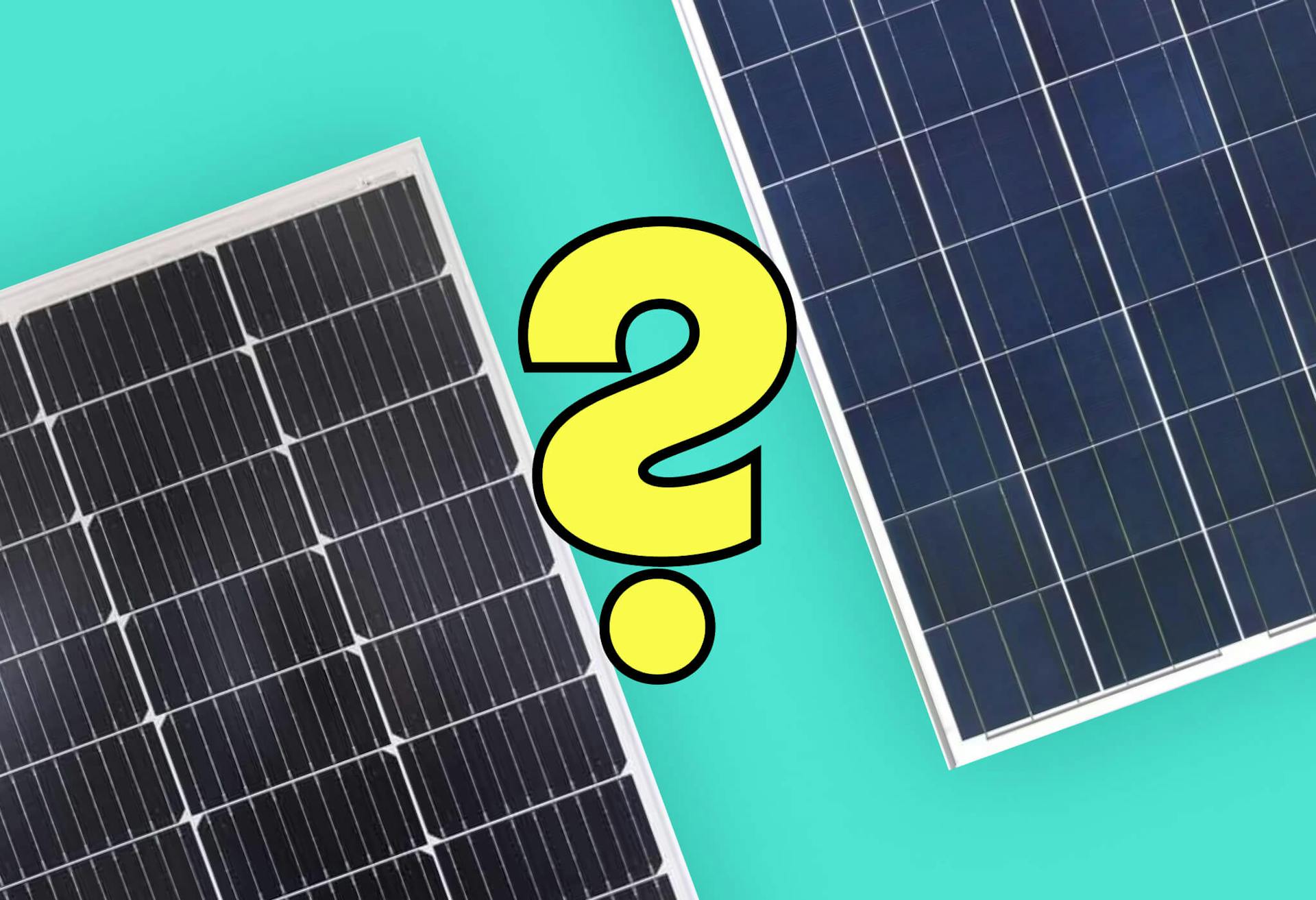
The 6 different types of solar panels
Read full story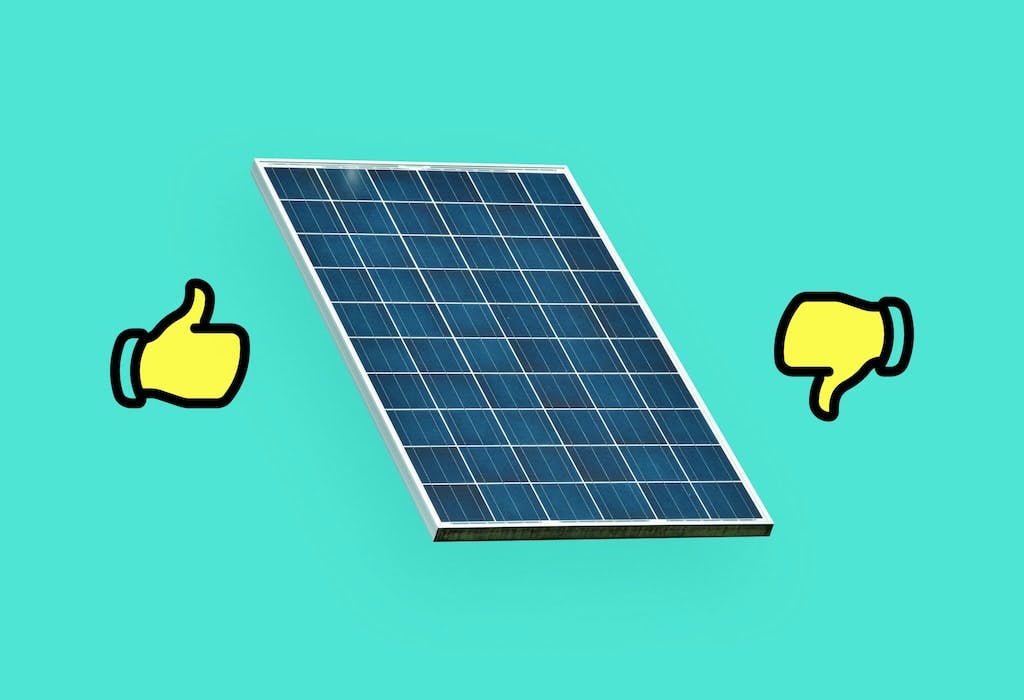
The pros and cons of solar panels
Read full story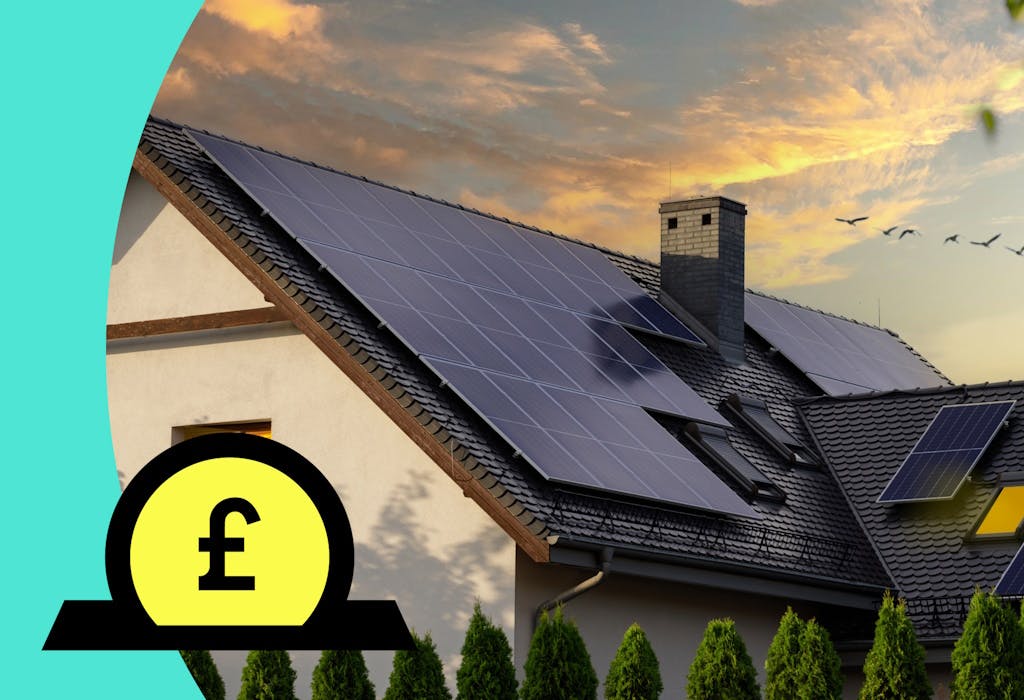
Are solar panels worth it in the UK?
Read full story
Written byJosh Jackman
Josh has written about the rapid rise of home solar for the past six years. His data-driven work has been featured in United Nations and World Health Organisation documents, as well as publications including The Eco Experts, Financial Times, The Independent, The Telegraph, The Times, and The Sun. Josh has also been interviewed as a renewables expert on BBC One’s Rip-Off Britain, ITV1’s Tonight show, and BBC Radio 4 and 5.
